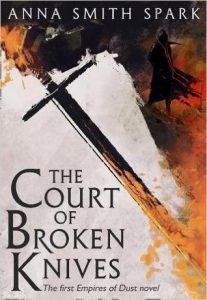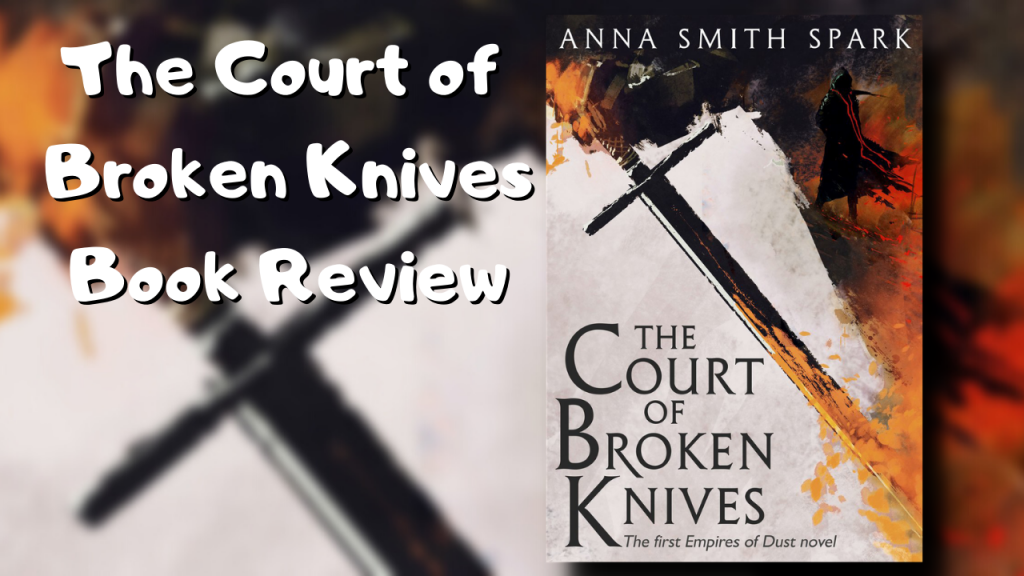The Court of Broken Knives by Anna Smith Spark – Book Review
And in case you prefer written reviews, here it is:
Series: Empires of Dust (#1)
Published by: Harper Voyager
Genre: Dark fantasy, literary fantasy
Pages: 470
 I have long meant to read through Anna Smith Spark’s Empires of Dust trilogy. The ways it’s spoken about make it out to seem custom-made for me: one of the darker series out there, it aims for a more literary tone, its language can be staggeringly beautiful, and its characters are finely crafted, clawing for even the smallest fragment of light in a world whose darkness overwhelms all. Reading it, I found all these purported qualities to be well in line with my own impressions, even as one sensation eclipsed all of them – a mixture of revulsion at the weakness of some of these characters, their greed, their powerlessness, their inability to learn from their mistakes; and a yearning to dive deeper, explore this hopeless world, where the price to craft a better tomorrow often turns that very tomorrow into dust. Or, in Spark’s own words, “Disgust and desire. Desire and disgust”.
I have long meant to read through Anna Smith Spark’s Empires of Dust trilogy. The ways it’s spoken about make it out to seem custom-made for me: one of the darker series out there, it aims for a more literary tone, its language can be staggeringly beautiful, and its characters are finely crafted, clawing for even the smallest fragment of light in a world whose darkness overwhelms all. Reading it, I found all these purported qualities to be well in line with my own impressions, even as one sensation eclipsed all of them – a mixture of revulsion at the weakness of some of these characters, their greed, their powerlessness, their inability to learn from their mistakes; and a yearning to dive deeper, explore this hopeless world, where the price to craft a better tomorrow often turns that very tomorrow into dust. Or, in Spark’s own words, “Disgust and desire. Desire and disgust”.
The language of The Court has weight behind it. Metaphors and other forms of comparisons borrow something from epic poetry, have almost the weight of Homeric similes, where the author draws the comparison at length, spending more time describing an imaginary, far-off world than they do the thing they’re actually describing (this definition, I’ve borrowed from Literature and History’s Doug Metzger—an excellent podcast for you audiophiles out there). Look to this quote:
The dragon was grey, a deep, storm-cloud grey in which all the colours of the world flickered. Its eyes were green, the green of trees and leaves. Eyes that knew things men could never know.
See how the colours are lingered over? How they expand the idea of the dragon in your mind, how they encapsulate knowledge and the natural world in ways far removed from what you might otherwise have glimpsed from the figure of the dragon, without the play on colours? Many of the finest descriptions in Broken Knives work in this same way, exhibiting an attention to language that is joyous to read.
Our main characters are Marith, an exiled prince who is supposed to be dead; Talia, a high priestess whose hands are dripping red with the blood of those sacrificed for her god; Tobias, a mercenary whose loyalty extends very little past his own well-being; and Orhan, a member of the ruling class of an Empire at its lowest point, a man who hopes to breathe life into the crumbling ruin of this empire. They are, one and all, compelling and repulsive, though not in equal parts. Marith is more loathsome while Talia is easier to root for, yet both have killed children. It could have something to do with the question of choice – the high priestess of The God of Living and Dying is forced to become a tool of his will—or the mere result of countless generations’ worth of traditions—while Marith’s reasons are far more selfish. Sentences such as the following certainly will do something to limit the appeal of a novel:
They were all in bed fast asleep. And so Marith went through the house and killed everyone in it. There was in fact a new-born baby. He killed it. He killed three children, three women, two men, a dog and a cat. Then he found a bottle of what was probably wood alcohol and drank it as fast as he could. By the time he reached the bottom he’d almost blotted out the noise the baby had made before it died. Then he lay down in the best bed and slept for a long time.
You’re forgiven to think, based on this quote, that Marith is a remorseless and brutal killer—and if you come away from this book with the impression that this is the case, I won’t try to assuage you—but there is another side to him that is hidden away, very difficult to glimpse from a perspective outside his own:
Oh no. No, no. He looked back at them. Rubbed his eyes wearily. All the joy had gone out of him. Replaced with shame. Disgust. He never wanted to see another drop of blood as long as he lived. He never wanted to hold a sword again. He couldn’t do this. He couldn’t Just make it stop. Make it all stop. Make everything go away. Help me, he thought distantly. Help me. Please.
He sighed and rubbed his his eyes again. ‘As long as I get the best bed afterward.’
Here again is a break between the self we show to the world and the one hidden deep within. Does it make Marith more palatable? That is at least in part a question of personal preference (though I’m hesitant to lay it all on the feet of your tastes for character, I’m also aware that the most twisted ones have the steamiest fan-fics written about them), but it does make Marith far more interesting.
There’s almost reminiscent of noir to grimdark fantasy, I’ve noticed: clipped sentences, the casual violence, a hurtling between sex and death. This last trait is especially evident towards the end of The Court as violence becomes almost orgasmic in its intensity, the joy of it the madness of obsessive love.
I am well impressed with Anna Smith Spark’s debut novel – well enough that now I’ve finished this review, I am ready to jump into The Tower of Living and Dying. This is not a book I can recommend to everyone—as the quotes have shown you, there is content here that will turn away many, and I’m sure there are fantasy readers who prefer to keep away from the more high-brow language Anna Smith Spark employs for the comfort of more straightforward prose. But if your interests lie in internal conflict as much as in external ones, if you’re eager to explore dark worlds and darker deeds, and the kernel of hope at the core of it—you might just find yourself gripped by The Court of Broken Knives.
Crowned in silver. Throned in gold. Radiant with light. Not a bad thing to see, surely?

